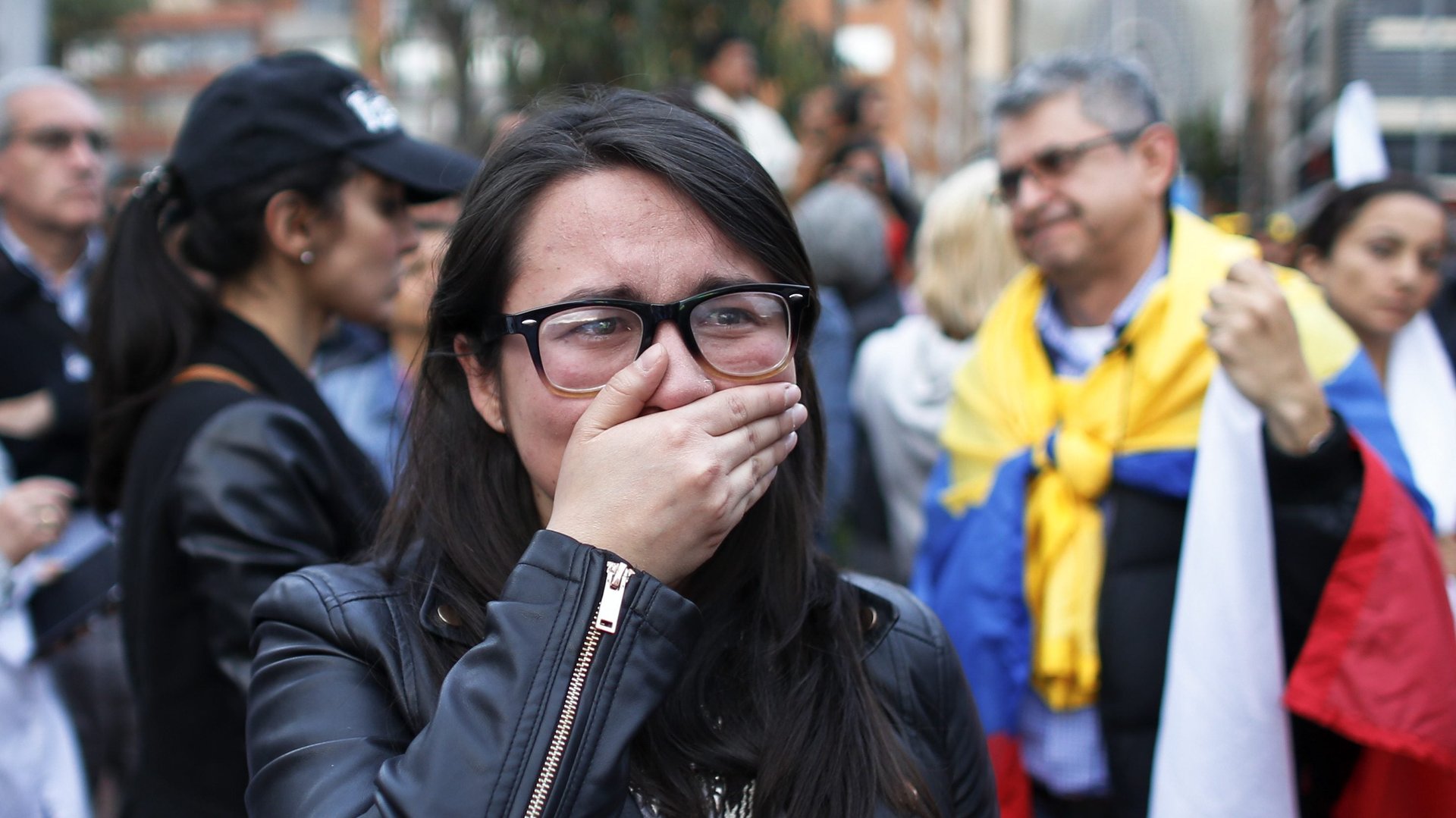Colombians have rejected the peace deal that was supposed to end 52 years of civil war
A referendum on a peace deal to end Colombia’s civil war has been rejected by the narrowest of margins. Just a few days before the vote on Sunday (Oct. 2), polls had predicted that the deal, which took the government and the Revolutionary Armed Forces of Colombia (FARC) four years of negotiations and brinkmanship to reach, would pass by as much as a two-to-one majority. Instead it failed by a margin of less than 0.5%.


A referendum on a peace deal to end Colombia’s civil war has been rejected by the narrowest of margins. Just a few days before the vote on Sunday (Oct. 2), polls had predicted that the deal, which took the government and the Revolutionary Armed Forces of Colombia (FARC) four years of negotiations and brinkmanship to reach, would pass by as much as a two-to-one majority. Instead it failed by a margin of less than 0.5%.
Why did voters say no?
Alvaro Uribe, who was president from 2002 to 2010 and pursued a get-tough policy against the FARC, was among those campaigning against the peace deal. He argued that since he stepped down, security had worsened and drug trafficking (one of the FARC’s main means of making money) increased. He also opposed the amnesty the peace deal would grant FARC militants, and the fact that it would allow figures from the movement to stand for election. Lots of voters apparently agreed.
And why was the former president against the deal? Some say it’s because the FARC killed his father in 1983 (which the FARC denies); others, that it’s a personal vendetta against Juan Manuel Santos, the current president, who was Uribe’s defense minister and who he doesn’t want to get the credit—and possible Nobel peace prize—for a deal. Uribe denies this: ”I’ve never done the politics of vendettas,” he told a journalist who helped write his memoirs.
So what happens now?
It’s not a cheerful picture. The Washington Office on Latin America, a human-rights body, explained ahead of the vote:
The accord—and perhaps the very idea of negotiating—would lose legitimacy, after more than four years of negotiations…
“If the public says ‘No,’ the process stops and there will be no result,” chief government negotiator Humberto de la Calle told Colombia’s El Tiempo newspaper. “We would have lost, quote unquote, ‘four years of our lives.’” Added former President César Gaviria, who is heading the campaign for the “Yes” vote: “The consequence of ‘No’ winning is war.”
There is always the possibility that the FARC leadership could continue the process despite the plebiscite result. “If ‘No’ wins, it wouldn’t mean that the process has to fall apart,” guerrilla negotiator Carlos Antonio Lozada said in late June. “We aren’t required by law to decide to continue such a painful war.” That, at least, is the view of top FARC leaders in Havana. It is a different question whether FARC fronts and blocs in the field would feel the same way, and especially whether they would trust the government’s security guarantees if the accords are rejected.
What about other militant groups?
Good question. The ELN, the other leftwing guerrilla group, said right after the FARC and the government signed their peace deal last week that it was ready to restart peace talks that had been stuck since March. That probably isn’t going to happen now. The AUC, the rightwing paramilitaries, officially demobilized a decade ago, but small successor groups are still causing trouble.
Sounds pretty bad all round.
It is. The one silver lining is that Colombia’s militias are all less powerful than they once were. Some 58,000 fighters have demobilized (pdf) in the past 13 years, and thousands are currently undergoing “reintegration” into society. If the war begins again, chances are the FARC will be in an even weaker position the next time the chance for peace negotiations presents itself—which could be years away. So it may have an interest in trying to find a compromise and a new deal.
Correction: This story initially referred to the ELN as rightwing paramilitaries instead of leftwing guerrillas.